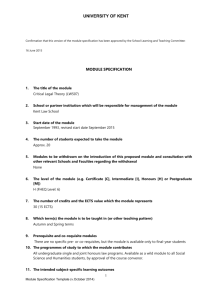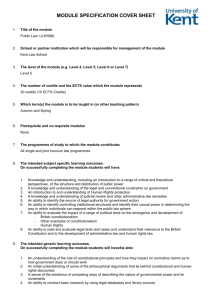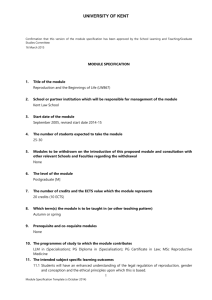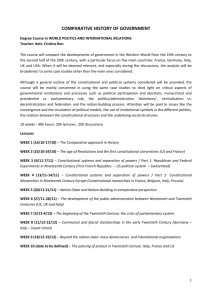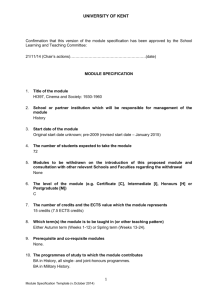University of Kent
advertisement
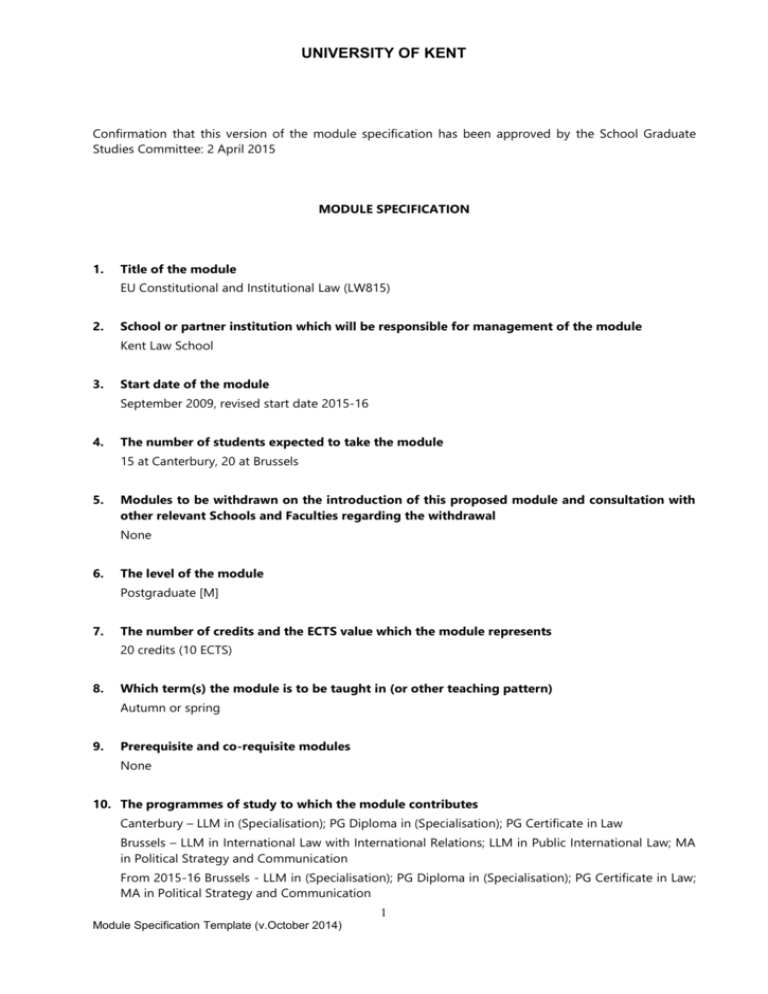
UNIVERSITY OF KENT Confirmation that this version of the module specification has been approved by the School Graduate Studies Committee: 2 April 2015 MODULE SPECIFICATION 1. Title of the module EU Constitutional and Institutional Law (LW815) 2. School or partner institution which will be responsible for management of the module Kent Law School 3. Start date of the module September 2009, revised start date 2015-16 4. The number of students expected to take the module 15 at Canterbury, 20 at Brussels 5. Modules to be withdrawn on the introduction of this proposed module and consultation with other relevant Schools and Faculties regarding the withdrawal None 6. The level of the module Postgraduate [M] 7. The number of credits and the ECTS value which the module represents 20 credits (10 ECTS) 8. Which term(s) the module is to be taught in (or other teaching pattern) Autumn or spring 9. Prerequisite and co-requisite modules None 10. The programmes of study to which the module contributes Canterbury – LLM in (Specialisation); PG Diploma in (Specialisation); PG Certificate in Law Brussels – LLM in International Law with International Relations; LLM in Public International Law; MA in Political Strategy and Communication From 2015-16 Brussels - LLM in (Specialisation); PG Diploma in (Specialisation); PG Certificate in Law; MA in Political Strategy and Communication 1 Module Specification Template (v.October 2014) UNIVERSITY OF KENT 11. The intended subject specific learning outcomes 11.1 To give students a firm grounding in the rules and concepts of EU constitutional and institutional law, and a deeper understanding of the broader social and political implications of European legal integration. 11.2 To enable students to become familiar with the main sources of EU constitutional and institutional law and to gain an understanding of how to access these materials for the purposes of preparing a module assessment. 11.3 To allow students to gain an insight into the operation of the EU legal system and into ways in which Union Law penetrates and becomes part of the national law of the member states. 11.4 To enable students to appreciate the constitutional issues and agendas which are frequently implicit in cases arising before the ECJ and national constitutional courts. 11.5 To allow students to engage directly with Court of Justice of the EU jurisprudence through oral presentation and analysis of selected cases 12. The intended generic learning outcomes 12.1 An ability to construct a critical argument in essay form, on the basis of independent research. 12.2 An ability to present a case, identifying the key concepts, the inter-relation between the facts and the legal arguments and providing a coherent account of the judgment and of its broader ramifications. 12.3 An increased confidence in oral communication by participation in seminar discussion of legal and non-legal issues and EU case law, individually and/or through teamwork exercises and by delivering a case presentation. 12.4 An ability to make proper use of the library resources by way of law reports, articles, monographs and textbooks. 12.5 An ability to make proper use of web-based material and to distinguish appropriate sources from inadequate ones. 12.6 An ability to apply critical, analytical and problem-solving skills in a wide range of different legal and non-legal settings in seminars and for the purpose of written assessment. 13. A synopsis of the curriculum This module focuses on the foundational rules, principles and doctrines underpinning the constitutional and institutional legal framework of the European Union. Against the backdrop of financial turbulence within the Eurozone and the recent structural reforms to the Union introduced by the 2007 Lisbon Treaty, this core area of EU law has gained heightened political and legal significance in the context of on-going debates on the nature and extent of European legal integration. The following specific topics will be considered in this module: the respective roles, competencies and powers of the EU’s main political and judicial institutions; foundational legal principles underpinning the EU’s legal framework including direct effect and supremacy of Union law; the relationship between the EU’s Court of Justice and national courts of the Member States; enforcement mechanisms of EU law; human rights in EU law; EU Citizenship; and legal aspects of the external relations aspects of the Union. In addition, at the end of the module students will have an opportunity to take stock and appraise the ‘constitutional’ nature and impact of the Union. 2 Module Specification Template (v.October 2014) UNIVERSITY OF KENT 14. Indicative Reading List The following are required as general reading and are available in the library. Additional reading will be recommended and detailed in lecture and seminar handouts; Craig, P. & De Burca, G.,EU Law ; Text Cases and Materials (OUP 2011) Chalmers/Davies/Monti, EU Law, 3rd ed (CUP 2014) Schuetze R, EU Constitutional Law (OUP 2012) Craig/De Burca (eds) The Evolution of EU law (OUP 2011) 15. Learning and Teaching Methods, including the nature and number of contact hours and the total study hours which will be expected of students, and how these relate to achievement of the intended module learning outcomes There are 200 study hours for the module, with two hours of contact time per week excluding reading and writing weeks. In addition the module convenor will be available to discuss any difficulties raised by students, particularly in relation to the preparation of the module assessments Teaching is through either a combination of lectures and seminars or through seminars alone in accordance with the teaching preferences of the module convenor.. Where provided, the objective of lectures is to provide an expository framework of the areas of law to be considered, upon which students may build more detailed knowledge of the subject through private study. The function of lectures is to contribute to the realisation of the specific learning outcomes cited in 11.1-4. Seminars will take the form of a detailed discussion of the more difficult concepts involved, the range of approaches which are available towards the analysis of the subject area and the identification of particularly problematic issues. Student participation will be actively encouraged. The function of seminars is to contribute to the realisation of the specific learning outcomes cited in 11.1-5 and to all the generic learning outcomes, particularly those cited in 12.3 and 12.6. 16. Assessment methods and how these relate to testing achievement of the intended module learning outcomes The module is assessed by 100% coursework. Students will be assessed through two assignments. They will be asked to write a 1000 word answer to an assigned question to be handed in mid-term. This piece of written work will comprise 10% of their grade. The 1,000 word assignment serves to underpin the achievement of the following module learning outcomes: 11.1-11.3 and 12.1-12.2 and 12.4-12.6. The second piece of written work will be an essay of 3-4,000 words for 90% of their grade. Essay: Essay topics will be provided by mid-term, though students may write an essay on another topic within the scope of the module providing the title of this is stated and approved by the module convenor in advance of submission. The facility for students to opt for an agreed essay topic outside those provided by the module convenor is thought to be of particular value to those students following interdisciplinary programmes of study, since it may allow those students to focus upon issues with cross-disciplinary dimensions. Assessment of student essays is undertaken in accordance with school Assessment Criteria which place particular emphasis upon the acquisition of relevant critical or evaluative skills. The essay assessment serves to underpin the achievement of the following module learning outcomes: 11.1-11.5 as well as and 12.1-12.6. Students learn and achieve the oral skills mentioned in 11.5 and 12.3 through formative seminar participation, in which informal feedback is provided on student presentations where given. 3 Module Specification Template (v.October 2014) UNIVERSITY OF KENT 17. Implications for learning resources, including staff, library, IT and space None 18. The School recognises and has embedded the expectations of current disability equality legislation, and supports students with a declared disability or special educational need in its teaching. Within this module we will make reasonable adjustments wherever necessary, including additional or substitute materials, teaching modes or assessment methods for students who have declared and discussed their learning support needs. Arrangements for students with declared disabilities will be made on an individual basis, in consultation with the University’s disability/dyslexia support service, and specialist support will be provided where needed. 19. Campus(es) where module will be delivered: Canterbury and Brussels 4 Module Specification Template (v.October 2014)



